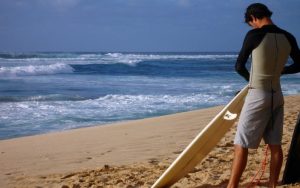Charlotte Injury Lawyer Matt Arnold answers the question: “Do I have to pay taxes on a settlement or jury award in a personal injury case?”
A waiver was not enough to protect a New Jersey waterpark from a lawsuit for gross negligence by one of its patrons injured in an accident there, a judge has ruled.
 When Roy Steinberg climbed aboard the FlowRider in 2010 at Sahara Sam’s Oasis Indoor and Outdoor Water Park, he had no idea it would be the last time he would have full control over his limbs. The ride attendant didn’t say anything about specific safety risks and the park’s employee only gave the riders minimal instructions on how to use the surfboard simulator. There were signs from the ride’s manufacturer on display from 2007, but they looked like the run-of-the-mill fine print your eyes are trained to ignore.
When Roy Steinberg climbed aboard the FlowRider in 2010 at Sahara Sam’s Oasis Indoor and Outdoor Water Park, he had no idea it would be the last time he would have full control over his limbs. The ride attendant didn’t say anything about specific safety risks and the park’s employee only gave the riders minimal instructions on how to use the surfboard simulator. There were signs from the ride’s manufacturer on display from 2007, but they looked like the run-of-the-mill fine print your eyes are trained to ignore.
So Steinberg stood on the imitation surfboard and took hold of a balance rope, held on the other end by a park employee, with both hands. Moments later, the ride started, sending a sheet of water meant to simulate an ocean wave. Steinberg slipped and fell, hitting his head and causing a catastrophic injury to his spine. He is now an incomplete paraplegic, meaning some motor or sensory function remains but that for all intents and purposes, his limbs are paralyzed.
Shortly after the accident, Steinberg and his wife sued the waterpark. As part of the waterpark’s routine protocol, he had signed a limited liability waiver upon entering the park. This forestalled the Steinbergs from being able to sue Sahara Sam’s for simple negligence. However, a limited liability waiver is just that in the legal protection it provides: limited.
This left the Steinbergs with one option: to sue the waterpark for gross negligence. Such a claim involves a much higher threshold than that for simple negligence, where the plaintiff (the injured party) must prove that the defendant breached the standard of care they owed the plaintiff (which is usually one of reasonable care). Instead, in a gross negligence claim the plaintiff must show that the defendant’s injury-causing behavior was excessively reckless, to the point that it exceeded all bounds of what is considered societally acceptable.
Two lower courts ruled that the waterpark’s misconduct alleged by the Steinbergs did not amount to gross negligence, and dismissed the case. After two appeals, the state’s highest court finally held that a jury could reasonably find that the park’s alleged conduct rises to the level of gross negligence.
The court made its decision based on the following findings: before the FlowRider went into operation, the waterpark had received an updated 2008 manufacturer’s manual. It recommended that parks post new signage that included more explicit safety warnings and pictorial displays. Novices using the ride were also supposed to lie, rather than stand, on the board. Anyone using the balance rope held by a park employee was supposed to do so one-handed.
Steinberg didn’t know any of these things because the park employees didn’t tell him. As it turns out, the park’s employees didn’t know all of these things either. Sahara Sam’s owner admitted during deposition that his staff was not required to read the rides’ operation manuals or any equivalent.
Of course, the Steinberg’s claim may still fail—that will be up to the jury if the couple doesn’t reach a settlement before trial.
If you or someone close to you has been injured, contact an experienced personal injury attorney today who can help you receive the compensation to which you may be entitled. Contact Arnold & Smith, PLLC for a free consultation, call at 704-370-2828 or click here for additional resources.
About the Author
 Matthew Arnold is a Managing Member of Arnold & Smith, PLLC, where he focuses on the areas of family law, divorce, child custody, child support, alimony and equitable distribution.
Matthew Arnold is a Managing Member of Arnold & Smith, PLLC, where he focuses on the areas of family law, divorce, child custody, child support, alimony and equitable distribution.
Mr. Arnold was raised in Charlotte, where he graduated from Providence Senior High School. He attended Belmont Abbey College, where he graduated cum laude, before attending law school at the University of North Carolina at Chapel Hill on a full academic scholarship.
A board-certified specialist in the practice of Family Law, Mr. Arnold is admitted to practice in all state courts in North Carolina, in the United States Federal Court for the Western District of North Carolina, in the North Carolina Court of Appeals and Supreme Court, and in the Fourth Circuit United States Court of Appeals in Richmond, Virginia.
In his free time, Mr. Arnold enjoys golfing and spending time with his wife and three children.
Source:
http://www.insurancejournal.com/news/east/2016/08/25/424452.htm
http://www.law360.com/articles/831553/nj-high-court-oks-gross-negligence-over-water-park-injury
Image Credit:
http://www.freeimages.com/photo/surf-hawaii-3-1368757
See Our Related Video from our YouTube channel:
https://www.youtube.com/user/ArnoldSmithPLLC/videos
See Our Related Blog Posts:
 Charlotte Injury Lawyers Blog
Charlotte Injury Lawyers Blog

